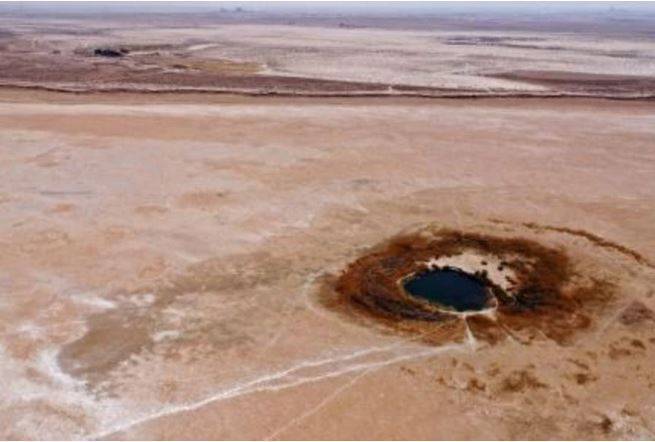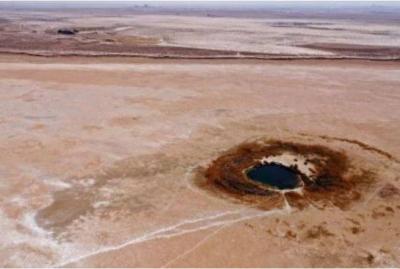On the edge of the desert in southern Iraq, any trace of Sawa Lake is missing except for a sign urging "no fishing," at a site that once served as a haven for biodiversity but has turned into arid land due to human activities and climate change. Today, there are only concrete remnants of buildings that were hotels and tourist infrastructure in the 1990s, welcoming families and newly married couples seeking outings or swimming. However, the situation has completely changed, as Sawa Lake has dried up entirely, and its shores are littered with plastic waste and bags caught on dry shrubs at the edges of the depression, accompanied by two rust-eaten metal frames of floating bridges that once spanned the lake's surface.
Environmental activist Hossam Sobhi (27 years old) stated, "This year, for the first time in its history, the lake has disappeared completely," pointing out that "the lake's water area was shrinking during the dry season in previous years." Now, only sandy land covered with white salt remains, along with a small pond where fish swim above the spring that connects the lake to its groundwater source.
The water level of Sawa Lake has been gradually declining since 2014, according to the Director of Environment in the Al-Muthanna Governorate, Youssef Suadi Jabbir. This official mentioned natural reasons behind the lake's drying, characterized by "climate change and rising temperatures in the arid Al-Muthanna Governorate, which suffers significantly from drought and low rainfall." Another reason stemming from human activity involves the boreholes drilled above the groundwater that once fed the lake, which were dug for nearby industrial projects, particularly related to cement and salt, consequently transforming the lake into "barren land," as per the environmental official. The government announced on Friday the presence of over a thousand illegal wells that have been dug for agricultural purposes.
Sawa Lake may need what resembles a miracle to return to its natural state, requiring both the closure of these illegal wells and a return of heavy rains after three years of drought in a country considered among the five most affected by climate change in the world. The Director of Environment in Al-Muthanna believes that "it is difficult for the lake to return to its former reality." The area has been under the "Ramsar" international treaty for the protection of wetlands since 2014, as indicated by a large sign placed at the shores of the low land that was once a lake. The sign also warns against "fishing in any form" and states "to not approach the spring feeding the lake at all."
The organization mentioned on its website that the "chemical composition of the water (in the lake) is unique," indicating that it is a "closed water body in a saline area." In the past, Sawa, which consists of "isolated clay rocks with gypseous material," was home to "many rare bird species in the world, such as the eastern imperial eagle, the marsh harrier, and the brown duck," according to the same report. Drought is not limited to Sawa; this is the case for many water bodies in Iraq due to increasing desertification and water scarcity. Social media consistently shares images of barren lands and dry regions, particularly in the marshes of the land of the Euphrates, listed as a UNESCO World Heritage site, including the Al-Hawizeh Marsh (south) and the Al-Razzazah Lake in Karbala Governorate, central Iraq.
The World Bank estimated that without appropriate policies, Iraq could see a 20% decline in available freshwater resources by 2050 due to rising temperatures. Water Resources Ministry advisor Aoun Dhiab attributed the drought in Sawa Lake partly to "the sharp decrease in rainfall." He pointed out that the rainfall rate in the area near the lake has dropped to 30% of its previous levels, cutting off the supply to the groundwater, which is simultaneously experiencing continuous withdrawal through the wells. All of this coincides with "rising temperatures (which led to) exacerbated evaporation" of the lake's water, according to the advisor.
The official spoke about governmental measures to limit the ongoing depletion of groundwater throughout Iraq, including banning the granting of any permits for new wells in certain areas, as well as closing illegal wells. Many residents of Al-Samawah, located 25 kilometers from the lake, have a strong connection to Sawa Lake. This includes Latif Dubais, 60 years old, who lives between his hometown Al-Samawah and Sweden, the country he moved to 30 years ago. Dubais has been working for a decade to raise environmental awareness in Al-Samawah through a cleanup campaign along the banks of the Euphrates River and converting his large backyard into a public garden. He recalls school trips and holidays in his childhood when his family would swim in the lake.
Dubais believes that "if the government cared about this issue, the lake would not have disappeared so quickly; this is illogical." He adds sadly, "I am a 60-year-old man who lived with the lake; I expected to die before it, but unfortunately, it died before me."




